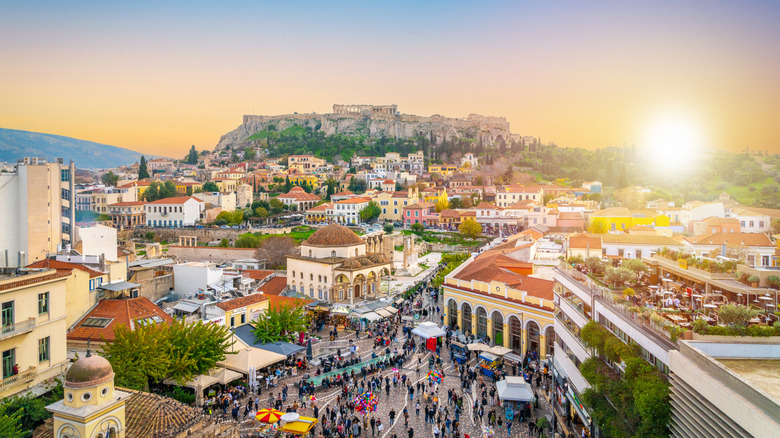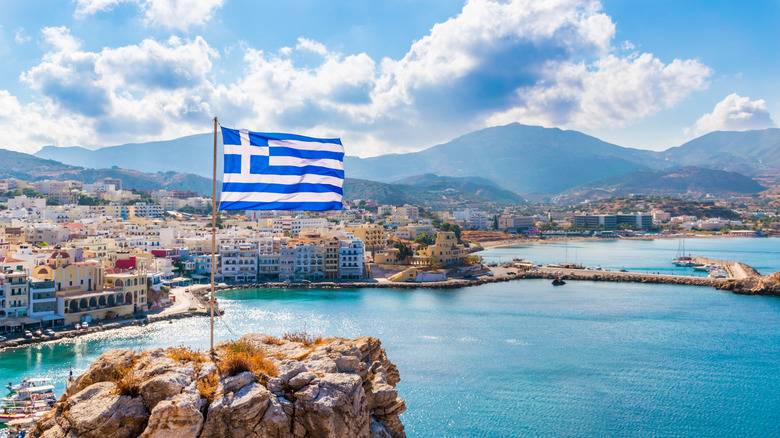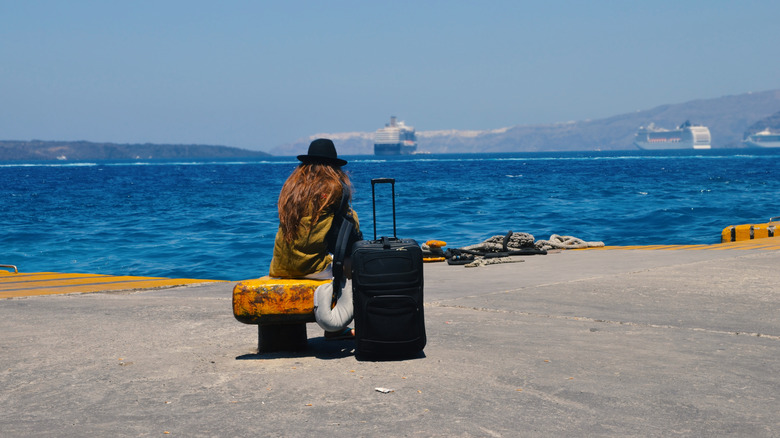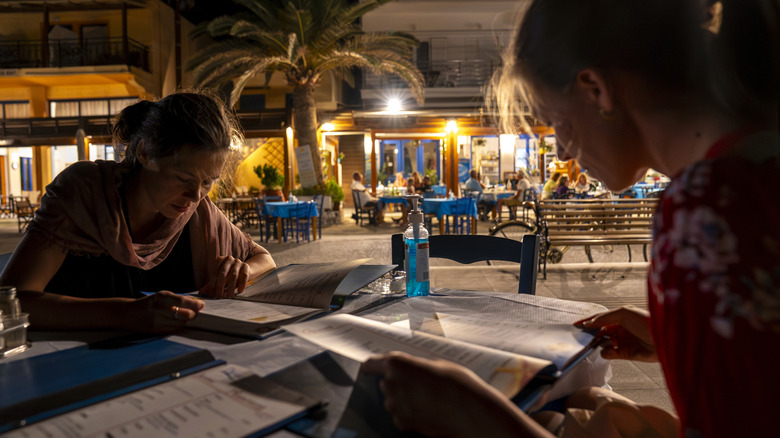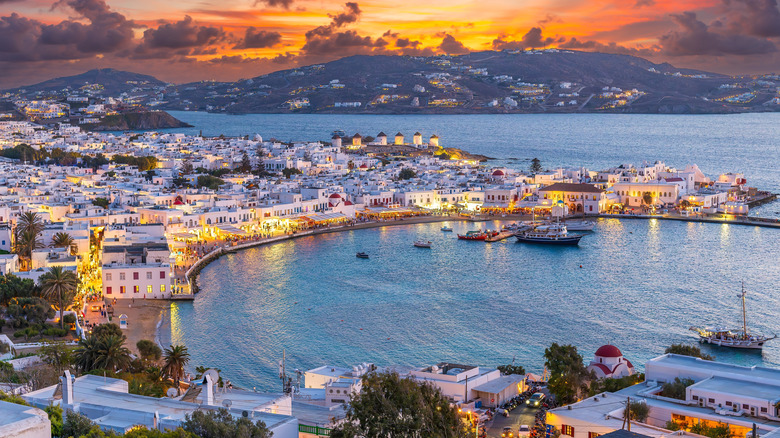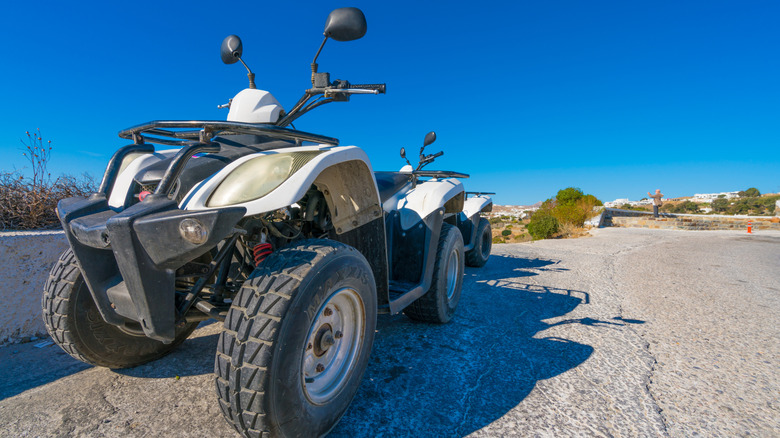13 Essential Travel Tips When Visiting Greece
Awash in Mediterranean charm, Greece is a mainstay on the bucket lists of many travelers eager to see something new and deeply enriching. One of the great civilizational homelands of European antiquity, Greece is a modern paradise for vacationers seeking all kinds of holiday options. Party destinations like Ios or Mykonos stand next to other fabulous Greek island options like Crete and Sifnos that are ideal for foodies. This is to say nothing of the immense history and vacation value that time spent on the Greek mainland offers.
No matter what your plan looks like when visiting Greece, there are some important organizational tasks that must play a role in your itinerary. From the reservation process to your packing list, a number of key travel tips need to make their way into your planning. Greece is a wonderful place with so much to offer many types of vacationers. Internalizing these travel insights will help you make the most of your time away, amplifying the fun in the process.
1. Pick a sea when island hopping
The first decision travelers will have to make is whether to explore islands in the Ionian Sea or branch out into the Aegean. For the most part, travelers won't want to pop back and forth between these two maritime areas. Both sides of the Greek mainland offer something special and exciting for travelers, but they are just too far away from one another to realistically bring island hopping that includes both areas into your plans. There's no wrong answer, but the kind of vacation you hope to enjoy can help determine which aquatic treasures will serve your needs better.
Travelers will frequently think of the Aegean first when considering their options in the region. It's home to some of the most popular Greek islands like Mykonos, Crete, and Santorini. You'll find a lively atmosphere and the iconic whitewashed colors that so often characterize the very notion of Greek island architecture. The Aegean Sea features some of Greece's most vibrant party islands, and these landscapes are rocky and dominated by yellow and brown hues. On the other side, a variety of laid back islands such as Corfu and Zakynthos feature lush greenspaces and a notable Italian influence. They're often the islands of choice for outdoor adventurers and family travel groups looking to relax on the beach or tackling some hiking.
2. Remember to bring cash and brush up on your negotiation skills
Outside of your normal routines and home environment, you'll interact with vendors that engage in a range of negotiable industries. Moreover, in many European cities and towns the art of bargaining is baked into some key tourist experiences. When buying souvenirs or arranging tour guide accompaniment, negotiating over price can get you a good deal. However, it's not expected in most consumer interactions beyond these areas. Keeping this in mind and brushing up on your bartering chops can help keep your budget intact as you interact with local business owners of all types.
One thing that helps swing the balance a little farther in your favor is a simple decision. Stopping at the airport ATM on the way out can make a huge difference in your vacation budget and purchasing power. It's always a good idea to carry at least some cash with you in a foreign country, and small bills are particularly helpful. Using your card isn't going to be a problem in most places across Greece, but if you have cash with you, reduced pricing might be available for some services, and you'll enjoy better flexibility.
3. Consider traveling during the low season
The summer is naturally a far busier time for travelers heading off to Greece. The country's iconic ancient temples and other heritage sites are overrun with tourists during these months, and if that's not enough to turn you off traveling at this time of year, the heat can be stifling. Battling crowds at tourist sites, fighting for reservations and transportation options, and paying through the teeth for accommodation and flights are all features that you should expect at this time of year.
Specifically, avoiding travel in June and August will serve you well. Greek students are also on holiday from school at this time. As a result, both foreign and domestic travelers ramp up the pressure across the entire landscape of attractions and activities.
Traveling during shoulder season is often your best bet. The weather remains incredibly inviting in the spring and fall months surrounding the high season. Warm temperatures and reduced pricing on every big ticket item during your trip come together to create an ideal vacation window for travelers looking to make the most of their time in Greece.
4. Fly to Athens first, then finish off your route with a regional alternative
Route planning is an underappreciated aspect of any trip to Greece. Naturally, visitors will have plenty of options to hop between islands and the mainland. But all too often people jump straight to building an itinerary that brings them directly to their target destination. Flying from the United States to Corfu or Crete is frequently possible with stopover itineraries in Rome, Amsterdam, or Paris, for example. But more often than not you'll pay far more for a flight route like this then you would by using what is frequently known as the "Greek islands hack."
Instead of looking into flights that bring you to one of these islands, plan your primary transit to take you only as far as Athens. Making Athens the endpoint from your home airport can save you hundreds or more. There's frequently less demand for major flight connections to these smaller island destinations from beyond the Greek domestic marketplace. This means you'll pay a premium to book flights that bring you door to door.
Instead, fly to Athens and then organize your onward transportation from within the local travel ecosystem. There are plenty of ferries departing on a daily basis to shuttle travelers throughout the islands, for one thing. More importantly, hopping on a ferry is a much more cost effective solution than bundling plane voyages together in an international itinerary. For those on a shorter vacation timeline, there are a number of low cost airline options that can take you to the island of your choosing as well.
5. Book activities, transit solutions, and more as early as you can
As is usually the case, the best way to keep your costs low is to plan your trip as early as possible. Purchasing tickets, reserving hotel rooms or alternative accommodations, and more is best done a month or longer out from your trip. You'll even want to explore entry tickets for local attractions ahead of your travel date.
Perhaps the most important thing to focus on is ferry reservations. If you know you are going to be transiting around Greece by sea, organizing your schedule and buying ferry tickets as early as you can will get you the best prices. Making early reservations also opens up a greater variety of options. Ferries and other essentials to support your travels throughout Greece can sell out, and if you're planning to arrive at a more popular time of year, they almost certainly will. Reserving your spot early gives you the best selection to choose from as you build the rest of your plans.
6. Download the VesselFinder app to more accurately plan your sea voyages
One feature of Greek transit that can't be overstated is the reality that things won't always go according to plan. It's not that Greek ferries are lackadaisical in their operations, but rather something to the contrary. This part of the world gets excellent weather, and across Greece you'll frequently enjoy a gentle sea breeze that cools everything down in the evenings. But this breeze can be whipped up into a frenzy out at sea. The waters are sometimes too choppy to navigate safely, and plenty of other factors can influence ferry timetables. On other occasions, delays simply can't be helped and there are certain points in the day when an increase in traffic frequently leads to delays in pushing off from the harbor.
Travelers can counteract this reality by downloading the VesselFinder app or going online to explore the data. This database provides nuanced information about when vessels have departed and arrived in the past. As you prepare your schedule, it's worth exploring the typical real world timings of the sailing you're considering. You might opt for an early morning departure, but if you find out that the ship is frequently delayed by an hour or more, all the benefits that this time slot seemingly delivers may be lost.
7. Shift your daily schedule to experience dinner the Greek way
Eating late is part of the culture in Greece. Many people won't sit down for dinner until 9 p.m. or later, with some restaurants seeing their busiest hours closer to midnight. Restaurants will frequently be open and accessible earlier in the evening to accommodate the routines and needs of tourists, but if you're eating at 6 or 7 in the evening you should expect to be dining in a relatively quiet environment. There's nothing wrong with this decision, but if you're looking to steep yourself in an authentic Greek setting you should shift your daily schedule to take full advantage of a vibrant cultural phenomenon.
Eating later in the evening will see you step into a restaurant during its busier period. You'll find locals communicating with one another, laughing and joking, and you might even catch some song and dance. These kinds of things are features of the Greek way of dining. Of course, eating later at night means that you'll likely head off to bed in the wee hours of the morning. For some, this won't jive with a schedule packed full of sightseeing and adventures. But if you're heading to Greece to relax on the beach and experience the culture, getting up a little later in order to stay out in the thick of it during routine dinner service will really deliver.
8. See a few islands on your adventure, but don't go overboard
It may be tempting for travelers who have never been to Greece before to jam in as many sightseeing opportunities as possible. In practice, this might mean that you'll be hoping to explore numerous islands in one trip. Everyone's itinerary will be different, and some travelers will have more time on their hands to spend in this fascinating landscape than others. But as a general rule of thumb, you'll want to cap your island hopping to about three different locations. In order to fully explore all that any of the Greek islands have to offer, you'll generally need about a week with the setting. This isn't always possible, but stretching your time even thinner by bulking up your travel between islands can ultimately sour the entire trip.
In order to get from place to place fast enough to experience more than just a fleeting glimpse, you'll need to book flights rather than take more leisurely sea routes. This can quickly become fairly expensive, limiting your budget for activities and other experiences. On the other hand, taking the ferry for all your travels between islands is frequently going to be too slow to really get much out of each place.
9. Check out Airbnb listings and consider skipping the hotel game altogether
There's a major discrepancy in quality when comparing hotel options across the value spectrum. Luxurious hotels naturally offer high quality experiences with plenty of features and inclusions. Stylistically, hotels falling outside the high end range tend to feel seriously dated. There's no getting around the drop off in the overall feel of a hotel when browsing options beyond the five star selections.
There's an alternative for travelers who aren't looking for high end accommodation but also don't want to feel like they're slumming it. Instead of booking a hotel room, consider going straight to Airbnb listings to find your accommodation while in Greece. Airbnb listings are expanding rapidly both on the mainland and across the scattering of Greek islands. The service grants access to a greater variety of property types; for instance, a group of friends traveling together might want to rent a house with a private pool.
The options are often ideal, but they come with a distinct drawback that conscientious travelers should keep in mind. The abundance of Airbnb listings across Greece has made the place bountiful for holidaymakers, but locals are finding themselves priced out of their homes at an alarming rate. If you are going to book an Airbnb, a sustainable-minded vacationer will want to ensure that it's locally owned to keep these tourism dollars in the community's economy.
10. Think about a money belt and other pickpocket-deterring solutions before arrival
Pickpockets are unfortunately fairly active in most tourist centers throughout Greece. Whether you're planning on exploring your chosen island's temples, ruins, and other cultural sites or just soak up the sun on the beach, you'll need to be wary of thieves. Utilizing a money belt or a similar defensive solution to keep your cash and cards safe is a valuable approach.
It's important to note that other elements of your overall presence can play a role in whether or not you are targeted. Europeans tend to dress with fewer labels and logos on their clothing, dressing up a bit in the process. There's such a notable difference in this regard that travelers hoping to avoid coming off as annoying tourists will leave college hoodies or sport team shirts at home. Dressing like a typical American abroad marks you as someone who might not to know to be on the lookout for pickpockets and other bad actors.
No matter how you present yourself, frequent travelers like Rick Steves have provided good examples for what to do if you find yourself in this kind of situation. Steves has actually been the victim of pickpocketing efforts on three separate occasions, even though he uses theft deterrent methods in his packing and typical dress. With that said, being the victim of a crime like this can really get you down. However, fighting that urge and remaining upbeat about your education experience is critical. In fact, it's one of the clever things Steves always tries to do when away.
11. Seriously consider renting a car if you plan to stay awhile
A short vacation to Athens or one of the urban areas on a Greek island requires little in the way of transportation planning. If you aren't going to travel around much while you're in Greece, there's really no need to fret over transportation beyond your movements to and from the air terminal or sea port. However, vacationers who seek to explore temples and ruins that might not be easily accessible will want to rent a car.
This is a non-negotiable step that provides vastly important mobility in a situation where public transportation may not be widely available. You'll frequently find that taxis can be hard to come by when venturing a good distance. Ubers can be found in Athens, but the service really acts as a bridge between riders and existing taxi operators rather than adding another transportation option into the mix.
Driving gives you the ability to go wherever you want whenever the mood strikes. Car rentals in Greece aren't typically very expensive, especially during low and shoulder seasons. Yet they deliver extreme mobility in order to put plenty of options in front of you to tailor your trip to the customized needs of you and your travel companions.
12. Steer clear of the quad bikes, especially on Mykonos
If you're driving on Mykonos, there's an additional aspect that needs to be taken into consideration. Greek roads can be a little nerve wracking at the best of times. Frequently drivers will find themselves navigating twisting and turning roadways that meander through mountainous terrain. Some of the most dangerous roads in Europe have attained their infamy for precisely these types of treacherous mountain pass conditions.
On Mykonos, however, perhaps the most pressing danger you'll encounter is an intoxicated driver on a quad bike. Quad bikes are a common rental staple on the party island. Unfortunately, plenty of people who rent and drive these around are young, party-minded visitors. Quad bike drivers who have been out at the bars before jumping on the vehicle to hit the road present a particularly intense danger.
If you're going to engage in quad biking, don't do it after you've been drinking. For drivers of standard cars, if you see a quad bike near you on the road, no matter where you are in Greece, your best bet is to give the driver as much space as possible and get away from them as quickly as you can. Not every quad biker will be irresponsible on the roadways, but there are enough examples of this kind of behavior to treat them all with caution.
13. Download an eSIM solution or get prepaid cards to cover your phone needs
Travelers will likely want to stay connected while away. Ideally, you won't be bringing work with you as you jet off to the sun soaked shores of a Greek island, but this doesn't mean that you'll want to unplug entirely. Having your phone on you in order to find directions to the activities and historical sites you want to visit and send pictures back home to loved ones to share your adventure are common practices.
Those coming from an EU country may have roaming data included in their service package. But travelers coming from across the Atlantic almost certainly won't. Investing in prepaid cards once you arrive in Greece or downloading an eSIM app will give you the connectivity you require, even in the most remote parts of the country's widespread landscapes.
